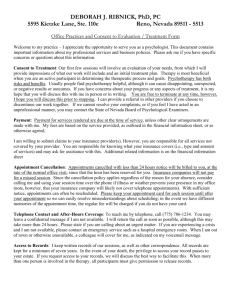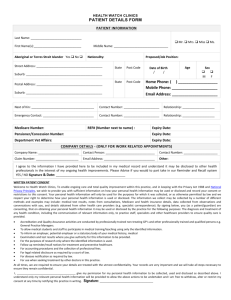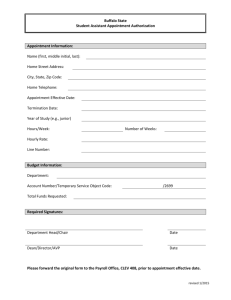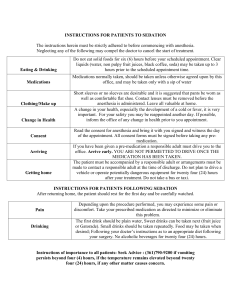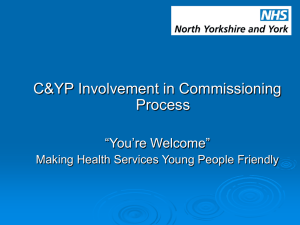Code of practice for giving out patient information over the phone v1
advertisement
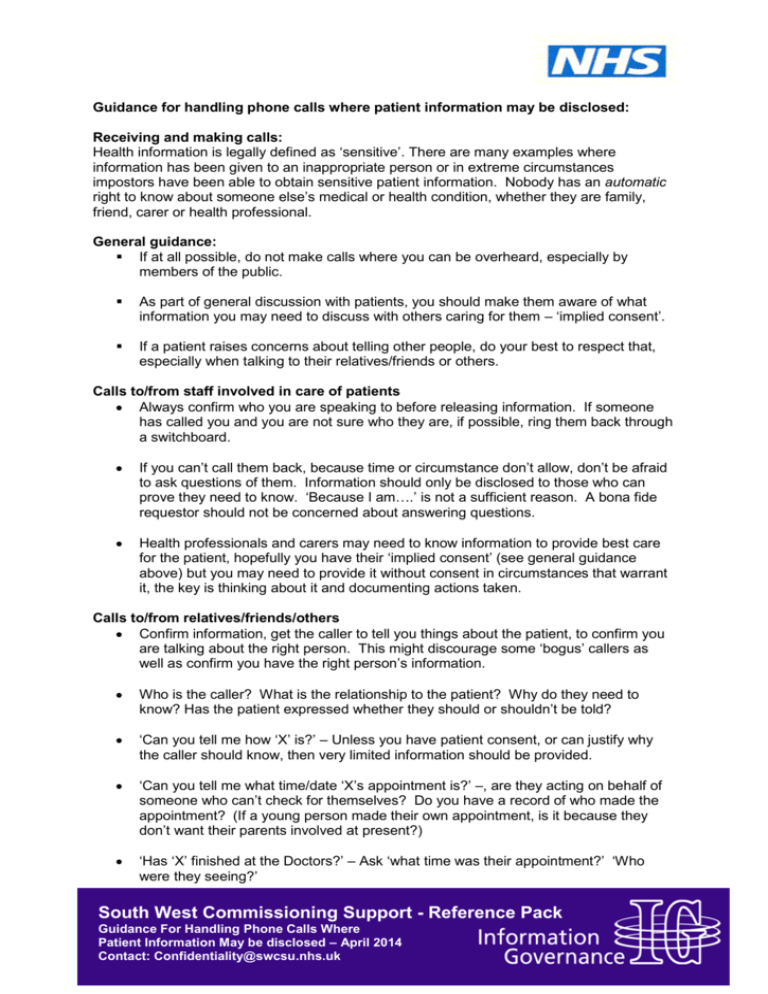
Guidance for handling phone calls where patient information may be disclosed: Receiving and making calls: Health information is legally defined as ‘sensitive’. There are many examples where information has been given to an inappropriate person or in extreme circumstances impostors have been able to obtain sensitive patient information. Nobody has an automatic right to know about someone else’s medical or health condition, whether they are family, friend, carer or health professional. General guidance: If at all possible, do not make calls where you can be overheard, especially by members of the public. As part of general discussion with patients, you should make them aware of what information you may need to discuss with others caring for them – ‘implied consent’. If a patient raises concerns about telling other people, do your best to respect that, especially when talking to their relatives/friends or others. Calls to/from staff involved in care of patients Always confirm who you are speaking to before releasing information. If someone has called you and you are not sure who they are, if possible, ring them back through a switchboard. If you can’t call them back, because time or circumstance don’t allow, don’t be afraid to ask questions of them. Information should only be disclosed to those who can prove they need to know. ‘Because I am….’ is not a sufficient reason. A bona fide requestor should not be concerned about answering questions. Health professionals and carers may need to know information to provide best care for the patient, hopefully you have their ‘implied consent’ (see general guidance above) but you may need to provide it without consent in circumstances that warrant it, the key is thinking about it and documenting actions taken. Calls to/from relatives/friends/others Confirm information, get the caller to tell you things about the patient, to confirm you are talking about the right person. This might discourage some ‘bogus’ callers as well as confirm you have the right person’s information. Who is the caller? What is the relationship to the patient? Why do they need to know? Has the patient expressed whether they should or shouldn’t be told? ‘Can you tell me how ‘X’ is?’ – Unless you have patient consent, or can justify why the caller should know, then very limited information should be provided. ‘Can you tell me what time/date ‘X’s appointment is?’ –, are they acting on behalf of someone who can’t check for themselves? Do you have a record of who made the appointment? (If a young person made their own appointment, is it because they don’t want their parents involved at present?) ‘Has ‘X’ finished at the Doctors?’ – Ask ‘what time was their appointment?’ ‘Who were they seeing?’ South West Commissioning Support - Reference Pack GuidanceforFor Handling Phone Calls Where Guidance Handling Phone Calls Where Patient Information May be Disclosed - April 2014 Patient Information May be disclosed – Contact: Confidentiality@swcsu.nhs.uk April 2014 Contact: Confidentiality@swcsu.nhs.uk 1 When calling some one at the request of the patient, or because they need to be contacted always try to speak directly to them without releasing information to whoever answers the phone if at all possible. Leaving messages on Answerphones: Patient confidentiality can be breached from messages left on answer phones, resulting in embarrassing or harmful situations arising. The following points offer guidance about this. Before leaving a message consider the urgency of getting the information to the patient. If it is not urgent and another attempt to speak to the patient can be made, do not leave a message. If you feel you have to leave a message, think about what you say, and leave the minimum amount of information – for example, ‘Please call (number) to talk about your appointment’ (This will be clear to the patient, but ambiguous to anyone else hearing the message.) Do not leave messages like this real example ‘The bad news is you have cancer, the good news is it is small…’ When the phone is answered by someone else: Always ask to speak to the patient, but don’t say where you are calling from initially. If they ask who is calling, you should respond with a minimum amount of information. Stating you are calling about their appointment may be sufficient. If they continue to ask where you are calling from, only tell them if the organisation name does not imply anything to do with the health of the patient. If the patient is not present, then unless there is a degree of urgency do not leave a message, but ask when is a good time to call back. If the patient is present but unable to speak (either due to language or physical difficulties), ask to speak to the next of kin. Before giving information to them, try to ascertain whether they are aware of why you may be calling (it may be necessary to reveal basic information to do this) This guide cannot be comprehensive about what is a complex area, as there are many case by case factors (patient mental capacity, implied consent etc) which may make a difference. The key really is to take a moment to think about: Who are you talking to? What information do they want? How much is really needed? Why do they need it? What impact might disclosing information have? Even if it seems basic, there have been issues relating to telling people about attendance etc Just these simple steps will go a long way to handling information correctly. Further details on any of the above issues are available from the Information Governance team – please contact confidentiality@swcsu.nhs.uk Guidance for Handling Phone Calls Where Patient Information May be Disclosed - April 2014 Contact: Confidentiality@swcsu.nhs.uk 2
